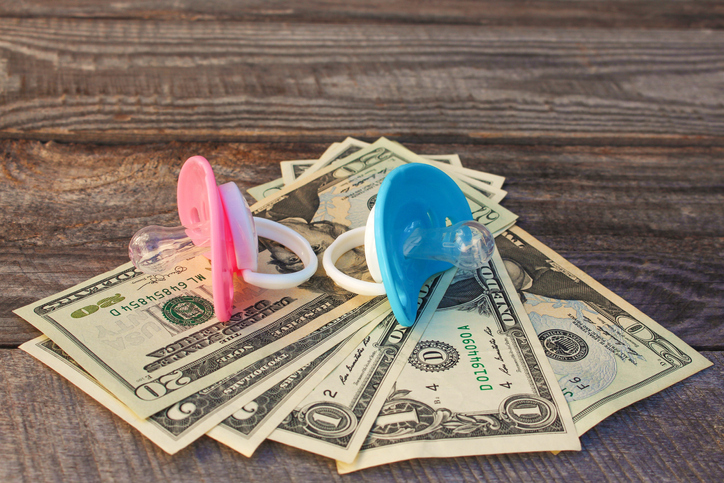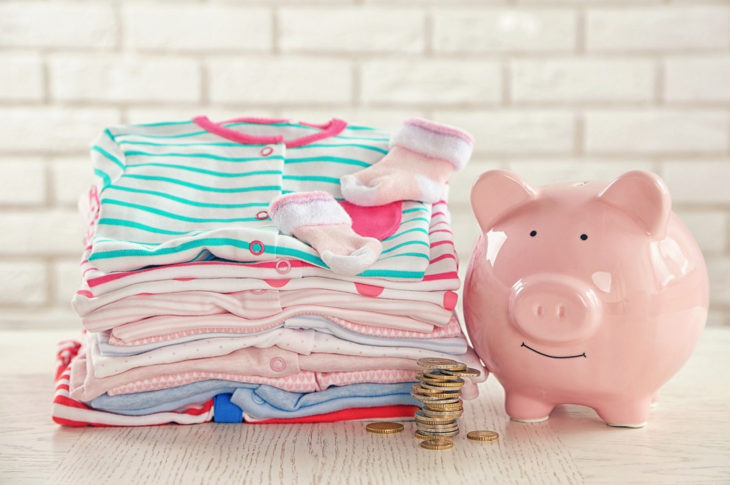I have two children, and we’re expecting our third (and last … hello, vasectomy!) in the spring. I recently saw a billboard that claimed babies cost about $700 a month. I did the math on my 2.5 kids, and holy disposable income; the figure hurt. The billboard was an advertisement to deter teenage pregnancy, but if I hadn’t already taken the plunge, it would have made 30-year-old me think twice before procreating.
Last night we sprung for a sitter and went to a nice restaurant. As my husband was enjoying a glass of wine and I was doing some hardcore coveting, our friends told us about a tropical vacation they took earlier this year. A few minutes later? The wife said she was worried they couldn’t afford to have kids. They’re both successful professionals who can afford getaways to tropical locals, but the thought of paying for children scares them.
This made me wonder—how on target was that billboard? Am I really spending the equivalent of a mortgage payment raising a family? Kim Danger, the founder of Mommysavers.com and author of The Complete Book of Baby Bargains, talked to me about how much it costs to raise a child and whether you really can afford to be fruitful and multiply.

Source: National Mortgage Professional
Contents
1. Identify baby’s basic needs
Most baby stores offer baby registry lists. Ignore them. It’s tempting to register for each item on the list, but many of them are convenient gadgets you can live without. “Baby’s basic requirements are actually pretty minimal,” says Danger. “Diapers, a basic wardrobe, milk or food, a blanket, health-related items (medicine, thermometer, etc), a safe place to sleep, a car seat, and toiletries are about all you need to start. Just about everything else is a want, and it should be looked at that way.” A sure-fire way to know if a cool gadget is worth it? Ask a real mom. Your friends can let you know if that travel bottle heater is a lifesaver or a waste of cash.
2. Conceive a new budget
Rework your current expenses to include everything you identified as a need in the previous step, as well as recurring costs like daycare and impacts to your health insurance premium. And that $700 billboard? Danger says it’s not far off the mark. “The cost of raising a child can be surprising—but when you factor in health care, child care, formula, and diapers it adds up quickly.” Still worried you aren’t factoring in everything you should? Danger suggests using an online calculator tool like this one.
3. Give your budget a trial run
Once you’ve worked out your new budget, Danger suggests trying it on for size. “If you find you’re coming up short, you can re-adjust as necessary,” she says. One responsible couple I know practiced their baby budget throughout pregnancy, banking what they expected to spend on daycare and actually purchasing the diapers. By the time their little girl finally arrived, they had a comfortable safety net in their savings account and an advance supply of diapers in her closet.
Even if your new budget looks impossible, don’t panic. “Like the saying goes, there’s never a perfect time to have a baby,” says Danger. “Since money is the number one cause of conflict in a relationship and the leading cause of divorce, choosing to have a baby when the finances are in good shape will help avoid additional stress on a marriage.” Practicing living without the money you’ll spend on baby will give you time to adjust and make adjustments as necessary. If you’re having trouble making ends meet on paper, look at creative ways to stretch your budget.

Source: Stars Insider
4. (Maybe) quit your job
I know, this sounds like it makes as much sense as eating cookies to dump your baby weight, but Danger brings up a good point. “Figure out how much your second income is worth. After computing the cost of daycare and expenses related to working full-time, you may discover you’re not making as much money as you think, and may want to consider having one parent stay home with the child.” If you or your hubs decide to be a full-time or work-from-home parent, you may be able to trim your budget significantly. “Besides day care, you will be saving money on transportation, work apparel, dry cleaning, and lunches out,” says Danger. “Be sure to think of every work-related expense you will be saving and include it in your calculation.” Plus, staying home with your new tax deduction may save you even more on your next return. “You may end up saving money on taxes if you choose to have one parent stay home with baby. Since most second incomes push families into a higher tax bracket, your first income will most likely be taxed at a lower rate.”
5. Or increase your income
If you and your spouse are too committed to your careers to walk away, there’s always the option of trying to bring home a little extra. “It can be easier for parents who are already on a tight budget to increase their income rather than save more. If parents have skills that may lend themselves to a part-time job (teaching piano lessons, doing simple repairs) now may be a good time to put them to use,” suggests Danger.
6. Look for ways to save
As you’re working your new budget, trim expenses that will be organically reduced once you have kids. The truth is that weekly dinners out may be a thing of your past, and getting to the gym may become impossible—at least temporarily. Strike these things from your budget, and you may see that by eliminating the expenses of your previous lifestyle, you will cover the costs of your new one. “Sometimes extreme measures can help too; trading a car (and the payment that goes along with it) for a paid-for clunker or going without a second car altogether can make a big impact,” says Danger. You may love your car, but once you have a child your ride’s going to be baptized with juice spills anyway. Saving that monthly car payment can be a life-saver, and you can always buy the nicer vehicle when your kids reach a less-messy stage of life.
When you start to look for them, there are tons of ways to save money. I know a lot of people who swear by consignment sales, and more who are queens of coupons. Danger recommends asking for freebies, too. “While you’re at the doctor, don’t be afraid to ask for medication samples tools like an infant syringe. It may save an expensive trip to the pharmacy.”

Source: Mammām un tētiem
The bottom line is that having children will affect your – well, bottom line. (And your bottom, but that’s a different article.) Can you afford them? With some creativity and wisdom, yes. Frugal people have children every day. And after all, while kids will go a long way in enriching your lives, you aren’t looking to expand your family as an investment.
Original by Colleen Meeks
